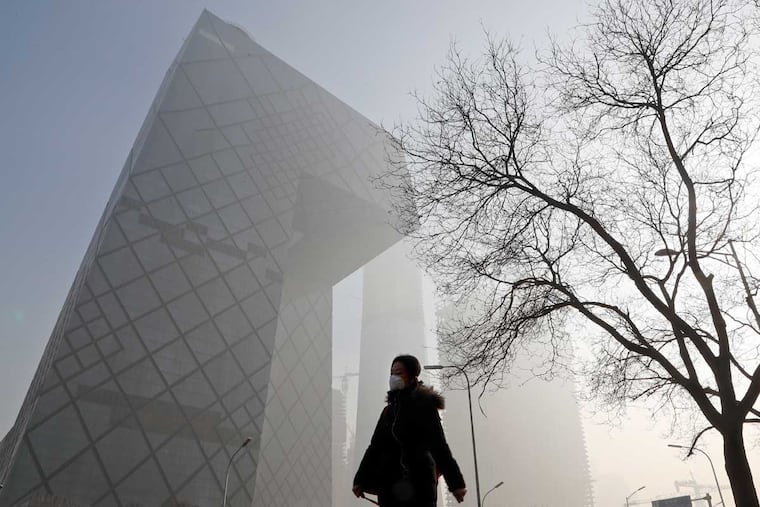China charging ahead into 'cleantech' future
The country is on its way to becoming the world leader in green energy, electric transportation, and climate policy. The reason? Its good business.

In 2009, when the world tried to negotiate a successor for the Kyoto Protocol in Copenhagen, the United States blamed the weak and unbinding agreement on China's unwillingness to accept even long-term limits on carbon emissions. China, suspicious of American and European attempts to curtail its growth, repeatedly refused to respond to President Barack Obama's pleas.
But recently, as the United States is feverishly attempting to undo its climate and cleantech policies, a scenario that few would have taken seriously appears to be unfolding: China is on its way to becoming the world leader in green energy, electric transportation, and climate policy. The reason? It's good business.
While China's official statements about its commitment to sustainable growth used to invite skepticism, there is every indication that its actions are now speaking as loudly as its words.
China invested more than $200 billion in clean energy in the last two years (about twice as much as the United States) and plans to spend $360 billion more through 2020.
It has announced an ambitious fuel-economy standard for cars that requires a fleet-wide efficiency of 47 miles per gallon. Sales of electric vehicles are booming; by 2020, the Chinese government wants 5 million plug-in electric cars on the road.
Coal use has dropped year-on-year since 2013. The official goals of reducing coal's share to 58 percent by 2020, and increasing clean energy's share to 20 percent by 2030, are likely to be met early. This is an infrastructure project of monumental proportions: it amounts to building an amount of renewable energy capacity similar in size to the entire U.S. power grid in 13 years' time.
Perhaps the most remarkable development is China's move to a nationwide cap-and-trade market for carbon-dioxide emissions later this year. Pilots are already underway in seven cities. Prices are generally substantially above those in the European CO2 market, currently the largest of its kind. China's market will be twice the size of Europe's and boost incentives for low-carbon technology deployment. These challenging endeavors require substantial market reforms, but the Chinese government has a tendency of getting things done.
Why is China going all-in on cleantech? And why did it recently condemn U.S. policy as "irresponsible and very disappointing," but also vouch to stick to its own pledges? Partly, it's out of necessity.
Widespread complaints about air pollution have dramatically changed China's stance on coal. But for the most part, the Chinese are showing their business acumen. By grabbing the lead in the fast-growing, multitrillion clean technology market, China will expand its position as the world's leading producer - and exporter - of the energy sources of the future. Politically, global climate leadership will further elevate China's international standing as an economic superpower.
Electric transportation is another enormous opportunity for China. Surprisingly, Chinese automakers have never succeeded in becoming major global players, and even struggle in the domestic market. The electric car revolution may change that.
Chinese automakers bet heavily on electrification, encouraged by a government that has thrown its weight behind it. Chinese electric models are not Teslas - they are small, mass-market, limited-range city vehicles that sell for less than $9,000 after subsidies. Chinese manufacturers are rapidly building up expertise and economies of scale in this important segment, and several have plans to enter the U.S. market soon.
Meanwhile, the picture in the United States could not be more different. The Trump administration plans to roll back fuel-economy standards for cars and trucks, cut EPA's funding by 31 percent, eliminate funding for climate research, scrap the Clean Power Plan, revitalize the coal industry, and no longer consider benefits when assessing environmental regulations. In his book Crippled America, President Trump claims that investing in renewable energy is a "big mistake" and "an expensive way to make tree huggers feel good about themselves." Other than that, the president considers himself "an environmentalist."
As much as China believes that cleantech is good business, the U.S. administration thinks that cutting back environmental standards will stimulate economic growth. This is completely misguided.
Let's face it: the best days of coal-fired power and gas-guzzling vehicles lie behind us. Removing regulation only puts the short-term interests of a narrow group of companies above the long-term growth potential of the economy at large, and removes desperately needed incentives for innovation.
And regulating automakers is like raising children: it is in everybody's - including their own - long-term interest to not always give them what they want. But this requires leadership. This is lacking in the United States. The result? America is looking back to the 20th century, while China prepares itself for the 21st.
Our president thinks that action on climate change and low-carbon investment is a waste of money. Chinese businesses are content with this attitude. As a Chinese wind executive put it: "Donald Trump is definitely an opportunity for us." This should concern Washington.
We cannot afford to give up in this crucial cleantech race and let China run away with all the patents, electric cars, and green jobs. We need a supportive government that shows true leadership, enthusiasm, and ambition to ensure that U.S. companies remain at the cutting edge. Just like China, we need standards to keep pressure on our companies to innovate, and a price on carbon to stimulate low-carbon investments.
Green energy is a perfect fit for Trump's agenda to bring back long-lasting jobs and infrastructure to left-behind places. If only he were to realize this himself.
Arthur van Benthem is an energy economist and an assistant professor of business economics and public policy at the Wharton School of the University of Pennsylvania. arthurv@wharton.upenn.edu